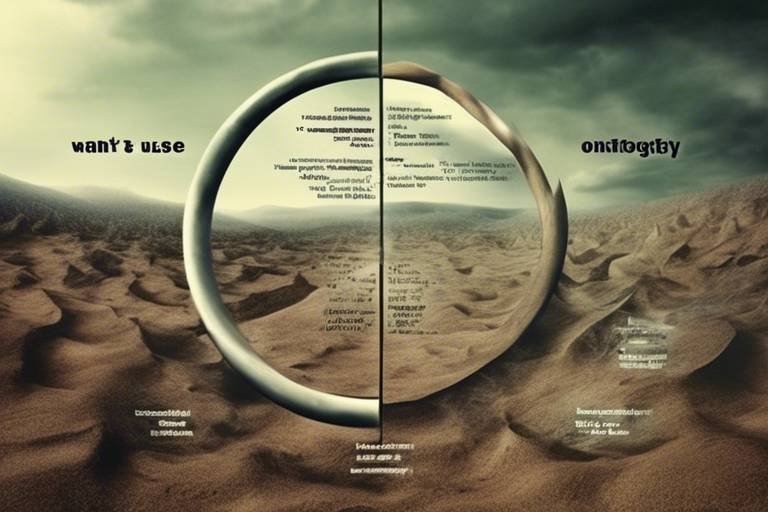Breaking Down the Elements of Ontological Pluralism
Ontological pluralism is a fascinating concept that invites us to rethink our understanding of reality. Imagine a vibrant tapestry, each thread representing a different way of being; this is what ontological pluralism embodies. At its core, it suggests that there are multiple, equally valid ways of existing in the universe. This idea challenges the traditional notion that there is one singular reality, a perspective that can often feel limiting or overly simplistic. Instead, ontological pluralism opens the door to a more expansive view, where different entities and perspectives coexist, each with its own validity.
To truly grasp the significance of ontological pluralism, we need to explore its foundational principles. First and foremost, it emphasizes the diversity of existence. This means acknowledging that different forms of life, consciousness, and even abstract concepts can hold their own unique realities. For instance, the way a scientist perceives the universe may differ vastly from the perspective of an artist or a spiritual thinker. Each viewpoint is shaped by distinct experiences, cultures, and contexts, leading to a rich mosaic of interpretations about what it means to 'be.'
Furthermore, ontological pluralism invites us to consider the implications of these varying perspectives. It encourages dialogue and understanding among differing worldviews, paving the way for collaborative problem-solving in areas like ethics, politics, and science. For example, when addressing environmental issues, an ontologically pluralistic approach might integrate scientific data with indigenous knowledge systems, allowing for a more holistic understanding of ecological challenges. This blending of perspectives not only enriches our comprehension but also fosters empathy and cooperation.
In the following sections, we will delve deeper into the historical context of ontological pluralism, exploring how it has evolved over time and the key thinkers who have shaped its discourse. We will also conduct a comparative analysis with monism, revealing the critical differences that set these two philosophical perspectives apart. As we navigate through critiques and counterarguments, we will assess the validity of opposing views while highlighting the resilience of pluralism. Ultimately, we will look towards the future, speculating on how ontological pluralism might continue to evolve in response to new philosophical challenges.
- What is ontological pluralism?
Ontological pluralism is the philosophical view that multiple, equally valid ways of being exist. It challenges the notion of a singular reality and embraces diverse perspectives. - How does ontological pluralism differ from monism?
While ontological pluralism recognizes multiple realities, monism asserts that there is only one fundamental reality. These differing views lead to contrasting understandings of existence. - What are the implications of ontological pluralism for science?
Ontological pluralism encourages interdisciplinary approaches, integrating various forms of knowledge and perspectives, which can enhance scientific inquiry and understanding. - Who are some key philosophers associated with ontological pluralism?
Prominent philosophers include William James, Nelson Goodman, and more contemporary thinkers who have contributed to the discourse surrounding this multifaceted topic.

Defining Ontological Pluralism
Ontological pluralism is a fascinating philosophical stance that asserts the existence of multiple, equally valid ways of being. Imagine standing in a vast, colorful garden where each flower represents a different reality; this is the essence of ontological pluralism. Rather than viewing existence through a singular lens, it encourages us to embrace a rich tapestry of realities, each contributing to our understanding of the world. At its core, ontological pluralism challenges the notion that there is only one correct way to interpret existence, pushing us to acknowledge the diversity of perspectives that shape our experiences.
To better understand this concept, we can break down its foundational principles. Firstly, ontological pluralism posits that reality is not monolithic; instead, it is composed of various layers and dimensions. This perspective is particularly significant in contemporary philosophical discussions, as it invites dialogue among different schools of thought. For instance, while traditional metaphysics often leans towards a singular view of existence, ontological pluralism opens the door to a multitude of interpretations, allowing for a more inclusive exploration of what it means to "be."
Consider the implications of this stance in everyday life. When we encounter different cultures, belief systems, or even scientific theories, ontological pluralism encourages us to appreciate these differences rather than dismiss them. It's like being at a buffet where you have the freedom to sample a variety of dishes, each offering unique flavors and insights. This approach not only enriches our understanding but also fosters empathy and respect for diverse viewpoints.
In essence, ontological pluralism invites us to recognize that our understanding of reality is shaped by our experiences, contexts, and interpretations. It challenges the rigidity of absolute truths, suggesting instead that truth can be multifaceted. This perspective is crucial in various fields, from ethics and politics to science and art, as it allows for a more nuanced exploration of complex issues.
As we delve deeper into the realms of ontological pluralism, it becomes clear that this philosophical stance is not merely an abstract concept but a vital framework for engaging with the world around us. By embracing the idea that multiple realities coexist, we open ourselves to a richer, more vibrant understanding of existence itself.

Historical Context
To truly grasp the essence of ontological pluralism, we must take a step back in time and explore its historical roots. This philosophical stance didn't emerge in a vacuum; rather, it has been shaped by centuries of thought, debate, and intellectual evolution. The journey into ontological pluralism begins with ancient philosophical traditions, where the seeds of pluralistic thought were sown. Early thinkers like Heraclitus, who famously stated that "everything flows," hinted at the idea that reality is not a singular entity but rather a complex interplay of various elements.
Moving forward to the Renaissance and Enlightenment periods, we see a significant shift in philosophical inquiry. The emergence of empiricism and rationalism brought forth new ways of understanding existence. Philosophers such as David Hume and Immanuel Kant began to question the nature of reality and the limits of human understanding. Their explorations laid the groundwork for later thinkers to consider multiple perspectives on existence.
The 20th century marked a pivotal moment for ontological pluralism. The advent of postmodernism challenged the rigid structures of previous philosophical frameworks. Thinkers like Michel Foucault and Jacques Derrida advocated for the recognition of diverse narratives and truths, which resonated deeply with the principles of ontological pluralism. Their work emphasized that no single narrative could encapsulate the entirety of human experience, thus paving the way for a more pluralistic approach to existence.
Furthermore, the influence of Eastern philosophies, particularly Buddhism and Taoism, introduced alternative perspectives on being and reality. These traditions often embrace the idea of multiple truths coexisting, challenging the Western philosophical inclination towards monism. This cross-cultural exchange enriched the discourse on ontological pluralism, allowing it to flourish in contemporary thought.
As we delve deeper into the historical context of ontological pluralism, it's essential to recognize the key movements and thinkers that have contributed to its development:
- Ancient Philosophers: Heraclitus, Parmenides
- Renaissance Thinkers: Descartes, Spinoza
- Modern Philosophers: Hume, Kant
- Postmodern Influences: Foucault, Derrida
- Eastern Philosophical Contributions: Buddhism, Taoism
In summary, the historical context of ontological pluralism is rich and multifaceted. It is a tapestry woven from various philosophical threads, each contributing to the understanding that reality is not a monolithic structure but a vibrant mosaic of perspectives. This historical backdrop not only provides insight into the evolution of thought but also highlights the ongoing relevance of ontological pluralism in contemporary philosophy.
- What is ontological pluralism? Ontological pluralism is the philosophical view that multiple, equally valid ways of being exist.
- Who are some key philosophers associated with ontological pluralism? Notable philosophers include Heraclitus, David Hume, Immanuel Kant, Michel Foucault, and Jacques Derrida.
- How does ontological pluralism differ from monism? Ontological pluralism asserts that there are many valid perspectives on existence, while monism posits that there is only one fundamental reality.
- What are the implications of ontological pluralism for science? It encourages a more inclusive approach to scientific inquiry, recognizing the validity of multiple frameworks and perspectives.

Key Philosophers and Theorists
When diving into the realm of ontological pluralism, it’s impossible to overlook the influential thinkers who have shaped this philosophical landscape. These philosophers have not only contributed to the understanding of multiple realities but have also sparked debates that continue to resonate in contemporary discussions. One of the earliest proponents of ideas that align with ontological pluralism is William James. His pragmatic approach emphasized that truth is not a singular entity but rather a collection of perspectives that can coexist. James argued that our understanding of reality is inherently shaped by our experiences, leading to the conclusion that different interpretations can hold validity.
Another pivotal figure is Nelson Goodman, who introduced the concept of worldmaking. Goodman suggested that the world is not a fixed entity but is constructed through various frameworks and languages. This idea aligns with ontological pluralism by asserting that multiple versions of reality can be constructed, each equally legitimate in its own context. His work invites us to consider how our perceptions and cultural backgrounds influence our understanding of existence.
Moreover, Hilary Putnam has made significant contributions to this discourse. He proposed the idea of internal realism, which posits that our understanding of reality is shaped by our conceptual schemes. Putnam’s perspective challenges the notion of a single, objective reality and supports the idea that different frameworks can yield different truths. This notion resonates deeply with ontological pluralism, as it underscores the importance of context in shaping our perceptions of existence.
Additionally, we must acknowledge the impact of Gilles Deleuze, who explored the concept of multiplicity in his philosophical works. Deleuze argued against the traditional notions of identity and being, advocating instead for a view of reality that embraces differences and variations. His ideas encourage a fluid understanding of existence, allowing for a multitude of realities to coexist. This perspective aligns seamlessly with the principles of ontological pluralism, reinforcing the idea that existence is not monolithic.
To further illustrate the contributions of these philosophers, the table below summarizes their key ideas and how they relate to ontological pluralism:
| Philosopher | Key Contribution | Relation to Ontological Pluralism |
|---|---|---|
| William James | Pragmatism and the idea of truth as multiple perspectives | Supports the coexistence of different realities based on experience |
| Nelson Goodman | Worldmaking and the construction of realities | Encourages the view that multiple frameworks can create valid worlds |
| Hilary Putnam | Internal realism and conceptual schemes | Challenges the notion of a single reality, promoting contextual understanding |
| Gilles Deleuze | Multiplicity and fluidity of being | Advocates for a view of reality that embraces differences |
In conclusion, the contributions of these key philosophers have laid a robust foundation for the exploration of ontological pluralism. Their ideas encourage us to question our understanding of reality and embrace a more nuanced view that recognizes the validity of multiple perspectives. As we delve deeper into the implications of ontological pluralism, it becomes clear that these thinkers have not only influenced philosophical discourse but have also provided tools for navigating the complexities of existence in a diverse world.
What is ontological pluralism?
Ontological pluralism is the philosophical view that multiple, equally valid ways of being exist. It suggests that reality is not singular but can be understood through various perspectives.
Who are the key philosophers associated with ontological pluralism?
Key philosophers include William James, Nelson Goodman, Hilary Putnam, and Gilles Deleuze, each contributing unique ideas that support the notion of multiple realities.
How does ontological pluralism differ from monism?
While ontological pluralism asserts that multiple realities can coexist, monism posits that there is only one fundamental reality or substance. This fundamental difference shapes how each perspective understands existence.
What are the implications of ontological pluralism?
Ontological pluralism has significant implications for science, metaphysics, ethics, and social theories, as it encourages a more inclusive approach to understanding diverse perspectives and realities.

Comparative Analysis with Monism
When we dive into the philosophical waters of ontological pluralism and monism, we find ourselves navigating two distinct yet fascinating perspectives on reality. At its core, ontological pluralism posits that there are multiple, equally valid ways of being. In contrast, monism asserts a singular, unified reality. This fundamental difference shapes not only their philosophical implications but also their applications in various fields.
To better understand these two perspectives, let's break down some key differences:
| Aspect | Ontological Pluralism | Monism |
|---|---|---|
| Definition | Multiple ways of being exist simultaneously, each valid in its context. | Only one fundamental reality exists, with everything else being a manifestation of it. |
| View of Reality | Reality is diverse and multifaceted, accommodating various interpretations. | Reality is uniform and consistent, often viewed as an interconnected whole. |
| Philosophical Implications | Encourages dialogue and integration of different perspectives. | Promotes a more rigid understanding of existence, often leading to absolutism. |
| Impact on Science | Supports interdisciplinary approaches and multiple scientific paradigms. | Favors a singular scientific method that seeks universal truths. |
This comparison reveals that while monism seeks to simplify the complexities of existence into a singular narrative, ontological pluralism embraces diversity and multiplicity. Think of it like a vibrant tapestry: monism views the tapestry as a single piece of fabric, while pluralism appreciates each thread's unique color and texture, contributing to the overall beauty of the design.
Moreover, the implications of these philosophical stances extend beyond mere theory. In practical terms, ontological pluralism can foster collaboration and innovation across different disciplines, encouraging scientists, ethicists, and social theorists to engage with a variety of perspectives. This is particularly relevant in today’s globalized world, where diverse viewpoints can lead to richer solutions to complex problems.
In contrast, the monistic view may lead to a more dogmatic approach, where alternative perspectives are often dismissed or marginalized. This can stifle creativity and limit our understanding of the complexities of existence. In essence, while monism might offer a sense of clarity and simplicity, ontological pluralism invites us to embrace the chaos and richness of life.
As we continue to explore these philosophical frameworks, it becomes clear that the dialogue between ontological pluralism and monism is not just academic; it has real-world implications. Whether in science, ethics, or social policy, the way we understand reality influences our decisions and actions.
In summary, the comparative analysis of ontological pluralism and monism highlights critical differences in how we perceive reality. While monism offers a unified perspective, ontological pluralism celebrates the diversity of existence, encouraging a more inclusive approach to understanding our world.
- What is the main difference between ontological pluralism and monism? Ontological pluralism asserts that multiple realities exist, while monism posits that there is only one fundamental reality.
- How does ontological pluralism impact scientific inquiry? It encourages interdisciplinary approaches and allows for various scientific paradigms to coexist, fostering innovation.
- Can ontological pluralism coexist with monism? While they present different views, elements of both can be integrated in discussions about reality and existence.

Implications for Science and Metaphysics
Ontological pluralism, with its assertion that there are multiple, equally valid ways of being, has profound implications for both science and metaphysics. At first glance, one might think that science, with its emphasis on empirical evidence and singular explanations, would be at odds with a pluralistic view. However, the reality is that ontological pluralism enriches scientific inquiry by encouraging a broader perspective on what constitutes knowledge and reality. It invites scientists to consider a variety of frameworks and models, recognizing that different approaches can yield valuable insights into the complexities of the universe.
For instance, consider the ongoing debates in quantum mechanics. The interpretations of quantum phenomena—such as the Copenhagen interpretation, many-worlds interpretation, and pilot-wave theory—illustrate how ontological pluralism can manifest in scientific discourse. Each of these interpretations offers a distinct perspective on the nature of reality, and while they may appear conflicting, they can coexist within a pluralistic framework. This coexistence allows for a richer understanding of quantum mechanics, as it acknowledges that our grasp of reality may not be limited to a single narrative.
Moreover, ontological pluralism challenges the notion of a monolithic scientific method. Instead of adhering strictly to one method, pluralism advocates for a toolkit approach, where scientists can draw from various methodologies depending on the context and the questions at hand. This flexibility can lead to innovative breakthroughs and a more nuanced understanding of complex systems, whether in biology, physics, or social sciences.
On the metaphysical front, ontological pluralism invites us to reconsider the very foundations of existence. Traditional metaphysical frameworks often lean towards monism, positing a single, underlying reality. In contrast, pluralism opens up discussions about the nature of being, suggesting that our understanding of existence is not only multifaceted but also context-dependent. This perspective can lead to exciting philosophical inquiries, such as:
- What does it mean for something to exist in different contexts?
- How do various ontological frameworks interact with each other?
- Can we reconcile conflicting ontologies, or are they fundamentally incompatible?
Engaging with these questions can lead to a more dynamic and inclusive metaphysical landscape, one that respects diverse perspectives and encourages dialogue across disciplines. Furthermore, it can help bridge the gap between scientific inquiry and philosophical exploration, fostering a collaborative environment where insights from one domain can inform the other.
In summary, the implications of ontological pluralism for science and metaphysics are vast and transformative. By embracing a pluralistic approach, we can cultivate a more comprehensive understanding of reality, one that acknowledges the richness and diversity of existence. This shift not only enhances scientific inquiry but also deepens our philosophical engagement with the world around us, paving the way for new discoveries and insights.
What is ontological pluralism?
Ontological pluralism is the philosophical view that multiple, equally valid ways of being exist. It challenges the notion of a single, objective reality and suggests that different frameworks can coexist.
How does ontological pluralism affect scientific inquiry?
It encourages scientists to adopt a broader perspective, allowing for multiple interpretations and methodologies. This flexibility can lead to innovative breakthroughs and a deeper understanding of complex phenomena.
Can ontological pluralism coexist with traditional scientific methods?
Yes, ontological pluralism can complement traditional scientific methods by providing a more inclusive framework that acknowledges the value of diverse approaches and interpretations.
What are the metaphysical implications of ontological pluralism?
It invites a reconsideration of the nature of existence, suggesting that our understanding of being is multifaceted and context-dependent. This perspective fosters richer philosophical inquiries and dialogues.

Critiques and Counterarguments
Ontological pluralism, while intriguing and thought-provoking, is not without its critics. Many philosophers and theorists have raised significant concerns regarding its validity and applicability. One of the primary critiques is the potential for ontological pluralism to lead to a form of relativism. Critics argue that if multiple ways of being are considered equally valid, it may undermine the pursuit of objective truth. They question whether this approach can provide a coherent framework for understanding reality, as it seems to suggest that any perspective could be justified, regardless of its empirical support or logical consistency.
Another common counterargument is the challenge of communication and understanding among different ontological frameworks. If individuals operate under vastly different notions of existence, how can meaningful dialogue occur? This fragmentation could hinder collaborative efforts in both scientific and philosophical endeavors, leading to a chaotic landscape where consensus is nearly impossible. Proponents of monism, which posits a singular, unified reality, often cite this as a reason to favor a more streamlined approach to ontology.
Moreover, critics contend that ontological pluralism risks becoming overly complex. The idea that there are countless valid perspectives on existence can lead to confusion and ambiguity. For instance, if we accept various ontologies, how do we prioritize or evaluate them? This complexity can be overwhelming and may detract from the clarity that is often sought in philosophical inquiry. As a result, some argue that the pursuit of simplicity in understanding existence should take precedence over the acceptance of multiple, potentially conflicting perspectives.
In response to these critiques, proponents of ontological pluralism argue that recognizing multiple valid perspectives does not necessitate a rejection of objective truth. They contend that pluralism can coexist with a commitment to empirical validation and rational discourse. They emphasize that pluralism encourages a richer understanding of reality, allowing for diverse experiences and interpretations that can coexist without negating each other. This perspective fosters an environment where dialogue and debate can flourish, rather than stagnate.
To further clarify the critiques and responses, the following table summarizes key points:
| Critique | Counterargument |
|---|---|
| Leads to relativism | Pluralism can coexist with objective truth. |
| Hinders communication | Encourages dialogue and diverse interpretations. |
| Overly complex | Promotes a richer understanding of reality. |
Ultimately, the discussions surrounding ontological pluralism are vital in shaping contemporary philosophical debates. As we navigate these critiques, it becomes clear that the dialogue between pluralism and its detractors is not merely an academic exercise but a necessary exploration of how we understand existence itself. By addressing these counterarguments, proponents of ontological pluralism can bolster their position, demonstrating that this philosophical stance is not only valid but essential in the quest for a comprehensive understanding of reality.
- What is ontological pluralism? Ontological pluralism is the belief that multiple, equally valid ways of being exist.
- Why do some philosophers critique ontological pluralism? Critics argue it can lead to relativism, hinder communication, and create unnecessary complexity.
- How do proponents of pluralism respond to these critiques? They argue that pluralism can coexist with objective truth and encourages a richer understanding of reality.

Applications in Contemporary Philosophy
Ontological pluralism has carved out a significant niche in contemporary philosophy, influencing various fields and sparking rich discussions. At its core, this philosophical approach acknowledges that there are multiple ways of understanding existence, which opens up a treasure trove of possibilities for ethical, political, and social theories. Imagine standing in a vast library with countless books, each representing a different perspective on reality; that’s the essence of ontological pluralism. It allows us to explore diverse viewpoints rather than confining ourselves to a single narrative.
One of the most notable applications of ontological pluralism is in the realm of ethical theory. In ethics, pluralism encourages the consideration of multiple moral frameworks, allowing for a richer and more nuanced understanding of moral dilemmas. For instance, when faced with a complex ethical issue, a pluralist approach might advocate for evaluating the situation through various lenses—utilitarianism, deontology, virtue ethics, and more—rather than adhering strictly to one doctrine. This multifaceted evaluation can lead to more compassionate and effective ethical decision-making.
Moreover, ontological pluralism plays a crucial role in political philosophy. In a world that is increasingly multicultural and interconnected, recognizing the validity of different political ideologies is essential. Pluralism encourages dialogue between diverse groups, fostering an environment where multiple voices are heard and valued. This approach can help bridge divides and create more inclusive governance structures. For instance, in discussions about democracy, ontological pluralism can advocate for recognizing various forms of governance that may better serve different communities, rather than imposing a one-size-fits-all solution.
In the realm of social theory, ontological pluralism also finds its footing. It challenges the dominant narratives that often marginalize minority perspectives. By embracing pluralism, social theorists can explore how different identities and experiences shape individuals' realities. This approach can lead to a more comprehensive understanding of social dynamics, as it acknowledges the complexity of human experiences. For example, in gender studies, ontological pluralism allows for the recognition of diverse gender identities, each with its own validity and significance.
To illustrate the impact of ontological pluralism in contemporary philosophy, consider the following table that highlights its applications across various fields:
| Field | Application of Ontological Pluralism |
|---|---|
| Ethics | Integrating multiple moral frameworks for richer ethical decision-making |
| Political Philosophy | Encouraging dialogue among diverse political ideologies |
| Social Theory | Recognizing diverse identities and experiences in social dynamics |
In conclusion, the applications of ontological pluralism in contemporary philosophy are as varied as they are profound. By embracing a pluralistic approach, philosophers can foster a richer understanding of ethics, politics, and social issues. This not only enhances philosophical discourse but also contributes to a more inclusive and empathetic society. As we continue to navigate a world filled with diverse perspectives, ontological pluralism serves as a guiding light, encouraging us to appreciate the myriad ways of being that coexist around us.
- What is ontological pluralism? Ontological pluralism is the philosophical view that multiple, equally valid ways of being exist.
- How does ontological pluralism influence ethics? It allows for the consideration of multiple moral frameworks, leading to more nuanced ethical decision-making.
- Can ontological pluralism impact political discourse? Yes, it encourages dialogue between diverse political ideologies and fosters inclusive governance.
- What role does ontological pluralism play in social theory? It recognizes diverse identities and experiences, enriching our understanding of social dynamics.

Future Directions in Ontological Pluralism
As we gaze into the crystal ball of philosophical inquiry, the future of ontological pluralism is brimming with possibilities. This dynamic field, which embraces the idea that multiple realities coexist, is poised to evolve in response to both emerging philosophical challenges and advancements in scientific understanding. So, where might ontological pluralism head in the coming years? Let's explore some exciting trajectories that could shape its future.
One of the most promising directions involves the intersection of ontological pluralism with technology. As we delve deeper into the realms of virtual reality and artificial intelligence, the question of what constitutes 'reality' has never been more pertinent. Imagine a world where digital environments coexist with physical realities, each offering unique experiences and truths. This convergence could lead to a richer understanding of existence itself, challenging traditional notions of being and prompting new philosophical inquiries.
Moreover, the increasing focus on interdisciplinary approaches is likely to influence the development of ontological pluralism. By collaborating with fields such as cognitive science, sociology, and even quantum physics, philosophers can enrich their understanding of how different realities interact. For instance, how might our perceptions of reality shift when viewed through the lens of quantum mechanics, which suggests that particles exist in multiple states until observed? Such interdisciplinary dialogues will not only broaden the scope of ontological pluralism but also ground it in contemporary scientific discourse.
Additionally, the rise of social movements advocating for diversity and inclusivity can provide fertile ground for ontological pluralism. As society grapples with issues of identity, culture, and existence, pluralism offers a framework that celebrates different perspectives and experiences. This could lead to a more nuanced understanding of social realities, where the coexistence of various identities is not just acknowledged but embraced as a fundamental aspect of human existence.
However, with these exciting possibilities come challenges. Critics of ontological pluralism often argue that it risks leading to a fragmented understanding of reality, where anything goes and nothing can be definitively known. Addressing these critiques will be essential as the field progresses. Proponents of pluralism may need to develop more robust frameworks that reconcile the multiplicity of realities with a coherent understanding of existence, ensuring that pluralism does not devolve into relativism.
In summary, the future of ontological pluralism is a landscape rich with potential. From technological advancements to interdisciplinary collaborations and social movements, the evolution of this philosophical stance promises to be as dynamic and multifaceted as the realities it seeks to understand. As we continue to explore these avenues, we may uncover deeper insights into the very nature of existence that challenge our assumptions and expand our horizons.
- What is ontological pluralism? Ontological pluralism is the philosophical view that multiple, equally valid ways of being exist, allowing for a diverse range of realities.
- How does technology influence ontological pluralism? Technology, especially in areas like virtual reality and AI, challenges traditional notions of reality and opens up new avenues for understanding existence.
- What role do social movements play in ontological pluralism? Social movements advocating for diversity and inclusivity can enrich ontological pluralism by highlighting the importance of various identities and experiences in shaping reality.
- What are the critiques of ontological pluralism? Critics argue that ontological pluralism may lead to a fragmented understanding of reality, where all perspectives are seen as equally valid, potentially undermining the search for objective truth.
Frequently Asked Questions
- What is ontological pluralism?
Ontological pluralism is the philosophical view that there are multiple, equally valid ways of being. It suggests that reality is not limited to a single framework or perspective, allowing for diverse interpretations and understandings of existence.
- How does ontological pluralism differ from monism?
While ontological pluralism embraces a variety of realities, monism posits that there is only one fundamental substance or reality. In essence, pluralism celebrates diversity in existence, whereas monism seeks unity in understanding reality.
- Who are some key philosophers associated with ontological pluralism?
Prominent philosophers who have contributed to ontological pluralism include William James, Nelson Goodman, and more recently, Quentin Meillassoux. Each has offered unique insights that enrich the discourse surrounding this complex topic.
- What are the implications of ontological pluralism for science?
Ontological pluralism can influence scientific inquiry by encouraging researchers to consider multiple perspectives and methodologies. This openness can lead to a richer understanding of complex phenomena, as it allows for diverse interpretations of data and theories.
- What critiques exist against ontological pluralism?
Critics argue that ontological pluralism can lead to relativism, where all perspectives are seen as equally valid, potentially undermining objective truths. Proponents counter that pluralism does not dismiss the validity of certain truths but rather acknowledges the complexity of existence.
- How is ontological pluralism applied in contemporary philosophy?
In contemporary philosophy, ontological pluralism is applied in various fields, including ethics, political theory, and social philosophy. It allows for a nuanced understanding of moral and social issues by recognizing the diverse beliefs and values that shape human experience.
- What future directions might ontological pluralism take?
The future of ontological pluralism may involve deeper engagement with emerging philosophical challenges, such as the implications of technology and globalization on our understanding of existence. As new perspectives arise, pluralism could evolve to incorporate these developments.



















